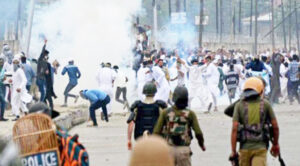 MOON Desk: Each year, October 27 is observed by the Kashmiris as a Black Day. On this day, in 1947, the Indian security forces had invaded the state of Jammu and Kashmir in violation of the Partition Plan, under which the British India was divided into India and Pakistan and the fate of this princely state, like several hundred others, was to be decided on the basis of the popular will.
MOON Desk: Each year, October 27 is observed by the Kashmiris as a Black Day. On this day, in 1947, the Indian security forces had invaded the state of Jammu and Kashmir in violation of the Partition Plan, under which the British India was divided into India and Pakistan and the fate of this princely state, like several hundred others, was to be decided on the basis of the popular will.
At that time, India’s pretext for invading Kashmir was its unilateral claim of concluding an instrument of accession with the then princely ruler of the state, the Maharaja of Kashmir. However, as hostilities broke out, India itself took the Kashmir dispute to the United Nations Security Council.
In subsequent years, the Security Council passed several resolutions, which recommended the holding of a free and fair plebiscite to determine the Kashmiri aspirations for joining either India or Pakistan. Pending the final settlement, a ceasefire line, later renamed as the Line of Control, has hence forth divided the disputed territory between the two countries.
Unfortunately, despite initially pledging to hold this plebiscite, India later backed out of its international commitment, reigniting the fire in Kashmir and war with Pakistan in 1965. After waging another major war in 1971, India and Pakistan agreed to bilaterally resolve the dispute under the 1974 Simla Accord. Yet, until this day, neither the UN-supervised plebiscite nor any bilateral settlement on Kashmir has seen the light of the day, the blame for which lies squarely upon India.
Instead, what the Kashmiris have faced is a reign of terror at the hands of the same security forces, which had introduced violence in the peaceful valley of Kashmir back in 1947. Since 1989, when the current phase of Kashmiri resistance began after years of Indian betrayal, the people of Kashmir have paid a heavy price, with the international community doing nothing about their plight. India has been in total denial of the basic freedoms guaranteed by the Universal Declaration of Human Rights, and all international covenants guaranteeing human rights and civil liberties.
In the last over three decades, the conflict has led to frequent crises between India and Pakistan, becoming a nuclear flashpoint since the Kargil war of 1999. It has tragically claimed the lives of tens of thousands of Kashmiris, besides numerous instances of missing persons, mass graves, the gang rape of Kashmiri women in a wave of repression denoted by an unprecedented military presence, the application of barbaric laws, and other instruments of subjugation and torture. These instances are well documented by the world’s leading civil rights organizations, including India’s own National Human Rights Commission.
If this was not enough, since August 5, 2019, India has raised the stakes in Kashmir by annexing and dividing the internationally disputed region. Its subsequent lockdown and repression, especially the enforced demographic shift currently under way, have aggravated the humanitarian crisis. Hence, the Kashmiris are now faced with even a more dangerous situation. Virtually, every passing day marginalizes their political status and socio-economic space, in a land that belongs to them through history, race and religion.





